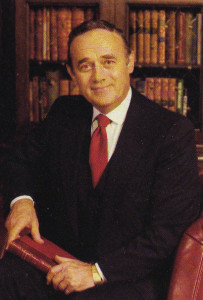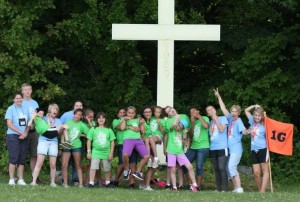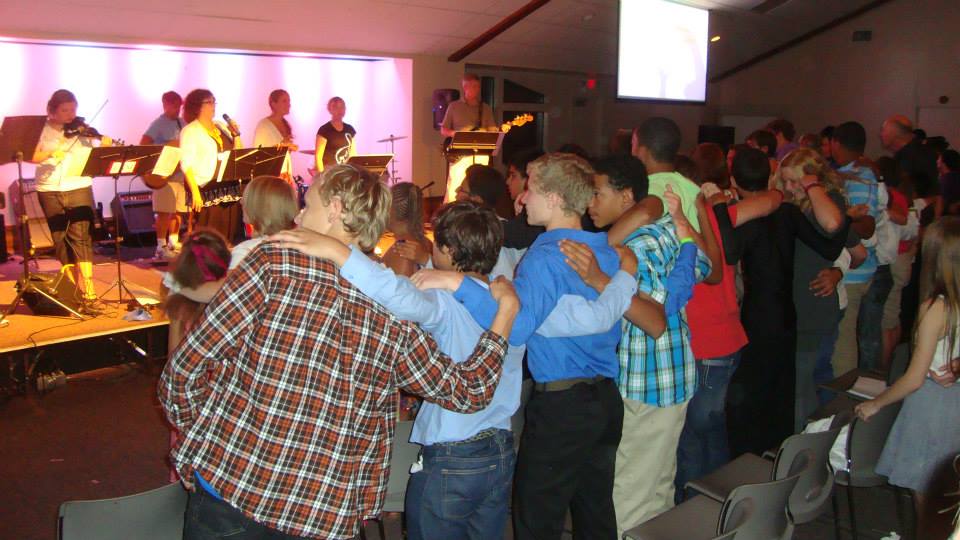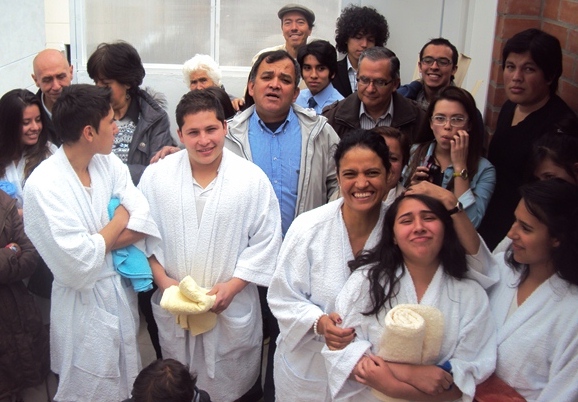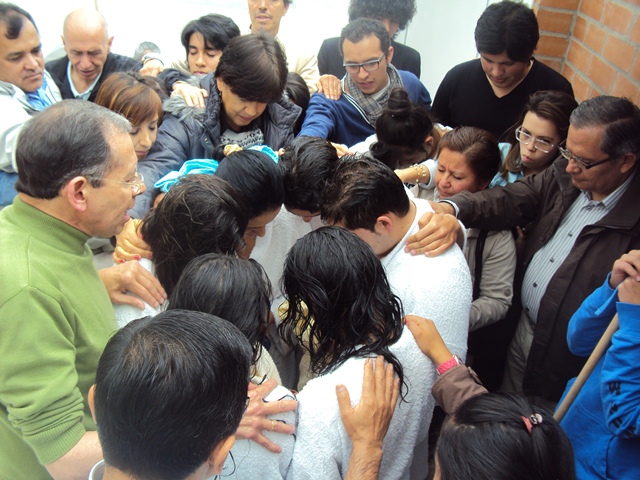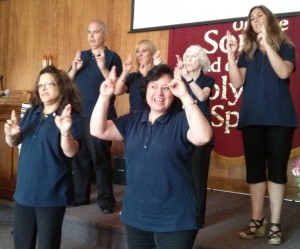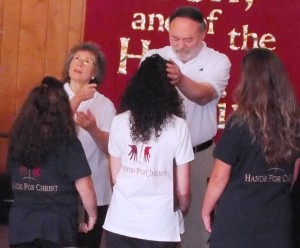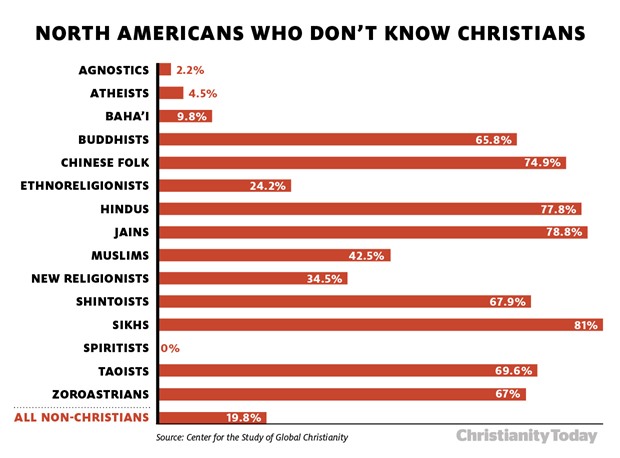This article was written by GCI regional pastor Ted Johnston in 1996 for the benefit of congregations he was pastoring in western Colorado. It is a tribute to GCI’s second Pastor General, Joseph W. Tkach and a reminder of our denomination’s amazing journey of change out of legalism and into grace.
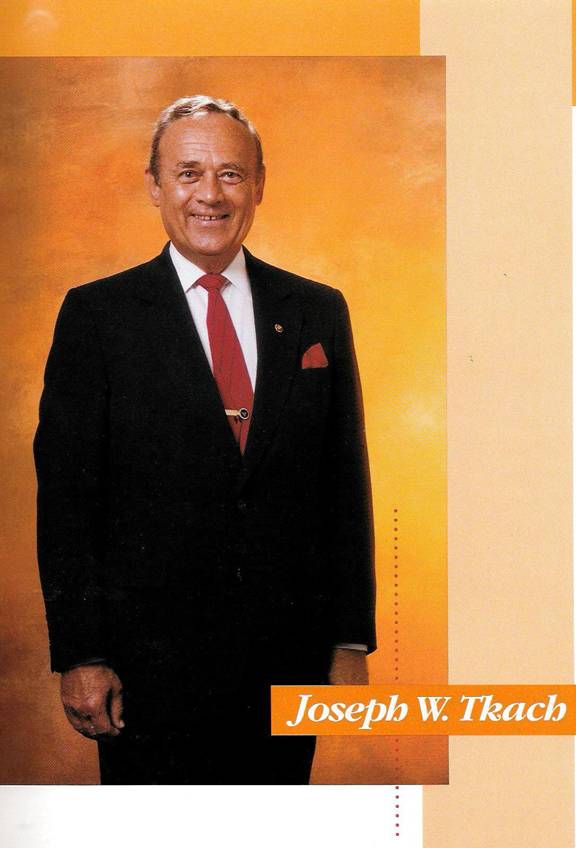 Joseph W. Tkach became the Pastor General of the Worldwide Church of God (WCG) following the death of Herbert W. Armstrong in 1986. Mr. Tkach began his tenure continuing the administrative policies and doctrinal teachings of his predecessor. In the 2/14/86 issue of The Pastor General’s Report (PGR), Mr. Tkach wrote: “God has laid a solid foundation through Mr. Herbert Armstrong. Our responsibility now is to begin building the superstructure.”
Joseph W. Tkach became the Pastor General of the Worldwide Church of God (WCG) following the death of Herbert W. Armstrong in 1986. Mr. Tkach began his tenure continuing the administrative policies and doctrinal teachings of his predecessor. In the 2/14/86 issue of The Pastor General’s Report (PGR), Mr. Tkach wrote: “God has laid a solid foundation through Mr. Herbert Armstrong. Our responsibility now is to begin building the superstructure.”
In the early months of his administration, as reflected in subsequent PGR articles, Mr. Tkach concentrated largely on the fiscal/organizational needs of the church. But as Pastor General he also had to deal with doctrinal matters. In the 1/28/87 PGR, adhering to the doctrine established under Mr. Armstrong, Mr. Tkach reconfirmed the church’s opposition to birthday celebrations. In the 2/10/87 PGR, however, he took exception to the church’s long-held position that the church, just before the tribulation, would flee to a specific place in the Middle East ─ the “place of safety.” Mr. Tkach assured the church that God offers protection to his people, but encouraged a less extreme, dogmatic position on the subject.
Perhaps the early traces of the theme that opened Mr. Tkach’s understanding on the subject of the covenants can be found in the 3/10/87 PGR where Mr. Tkach wrote on the subject of grace. He showed how grace is illustrated by the New Testament Passover observance. In the same issue he also cautioned the church about being overly dogmatic regarding the chronology of Old Testament Passover events ─ matters of historical rather than theological significance.
In the 3/18/87 PGR, Mr. Tkach followed his discussion of grace by introducing his first major doctrinal change. It involved correcting the church’s position on the meaning of Jesus’ broken body. Rather than seeing Jesus’ beating as payment for “physical sin,” Mr. Tkach showed how the broken body of Jesus, together with his shed blood constitute his complete sacrifice for our sins. This understanding was fundamental to describing, in the same article, a change in the church’s former position on healing and the prohibition of using medical doctors. He wrote, “Jesus’ broken body has far more significance than only our temporal physical healing….Seeking medical attention and having faith in God need NOT be opposites!”
With these letters in early 1987, Mr. Tkach was leading the church to emphasize the centrality of grace in the person of Jesus Christ. This would prove to be an important beginning toward confronting, some eight years later, the church’s deeply ingrained legalism. But there was a long way to go ─ Mr. Tkach continued to believe that certain requirements of the old covenant were binding on all Christians. For example, the 3/24/87 PGR clarified how members should unleaven their homes as part of the church’s required observance of the Days of Unleavened Bread.
In the 6/24/87 PGR, Mr. Tkach upheld one of Mr. Armstrong’s teachings, stating that women should generally not wear makeup. This same issue was revisited, however, in 11/88 when Mr. Tkach reversed himself, allowing women to wear makeup if they wished. Mr. Tkach’s concern for women was illustrated again in January 1988 when he began to write on the role of women in the church ─ particularly within the family structure. He saw a need for the church to modify its views regarding the role of women to more accurately reflect the teaching of Scripture.
In the 4/12/88 PGR, it can be seen that the church under Mr. Tkach’s leadership continued to believe that old covenant laws should be administered in the church. A brief article notes that the land Sabbath law, though not seen as binding on Christians in a specific way, is to be practiced by each individual “according to his own unique circumstances.” Statements like this were characteristic of the church’s practice of picking and choosing among old covenant requirements, doing the best it could to apply them to the 20th century situation. It was not always easy.
In the 8/2/88 PGR, Mr. Tkach began to explore the church’s teaching on the nature of the gospel and the commission of the church. He emphasized that preaching the gospel and feeding the flock are equally important aspects of the church’s commission. This served as somewhat of a corrective to the church’s historic emphasis on preaching to the world as “the first commission.”
In the 10/25/88 PGR, Mr. Tkach wrote about the importance of getting rid of prejudice ─ his concern about racism in the church is beginning to surface. Then in the 11/22/88 edition he writes more about the doctrinal change on healing which by this time is leading some to leave the church.
In the 1/17/89 PGR, Mr. Tkach announces publishing of the booklet “Who Was Jesus?” providing a definition for the gospel that emphasizes the historic role of Jesus. This contrasts with the church’s past definition of the gospel as “the good news of the soon-coming Kingdom of God.” Mr. Tkach wrote:
I believe this will be one of our most vital and important pieces of literature as we continue to do the job of preaching and teaching the full gospel of Jesus Christ ─ the unparalleled good news about the salvation of mankind through Jesus, and His prophesied Second Coming to establish the Kingdom of God.
At this time Mr. Tkach was evidently thinking a good deal about who true Christians are and what God requires of them. In the 1/31/89 PGR, he wrote:
A true Christian will be striving to obey what God teaches in His Word to be His will. But even in that, he will not be doing it for the purpose of appearing righteous, or to make others think he is righteous. We all realize, of course, there are some things that should not be eaten and that our appearances should be appropriately modest. Yet we must look at the substance, not just the form. The true Christian will be obeying God because Jesus Christ lives in him…That means he will be obeying God from the motivation of love, of true concern and feeling for the well-being of others…If love is not present, all the obedience in the world is of no lasting value!…What is the difference between true Christians and “professing Christians”? Though both may be striving to keep God’s commandments, the true Christian obeys God in love and in humility. He does not think of himself as spiritually superior to others.
By this time, many errors were being found in Mr. Armstrong’s writings. In the 2/14/89 PGR, Mr. Tkach writes that Mystery of the Ages (Herbert Armstrong’s final book) and certain other literature published by the church were being removed from circulation, “It is critically important that God’s church never be in the position of continuing to put out what may be misleading or inaccurate material once we have become aware of it. God expects us to continually be growing in understanding and knowledge.” This proved to be a very unpopular announcement among many in the church.
In the 3/28/89 PGR, Mr. Tkach returned to the subject of God’s grace, writing about the relationship between grace and obedience, “Our indebtedness to God for His indescribable grace should motivate us to strive to show ourselves eternally grateful, to devote ourselves to pleasing Him, to following Him, to living by every word He speaks.”
In the 5/22/89 PGR, Mr. Tkach continued to uphold what Mr. Armstrong had taught on the subject of tithing, noting that a Christian who fails to pay a full 10% is “robbing God.” But in the 6/27/89 issue, Mr. Tkach was beginning to be troubled about the Church’s long-held emphasis on speculative prophecy. He wrote that we “need to take the focus off fruitless speculation and assumptions about prophecy.” In the 12/5/89 PGR he asks, “Is our faith founded upon our understanding of the fulfillment of specific prophecies, or upon the truth of the death, resurrection and promises of Jesus Christ?”
Continuing to write about members’ attitudes toward people outside the church, he wrote in the 10/2/89 issue that we should not take a “superior-inferior attitude toward other people.” Some in the church, however, could not shed this attitude. In December 1989 a large splinter group, the Philadelphia Church of God, was formed under former WCG minister Gerald Flurry. A polarization within certain parts of the church was beginning. Yet, the biggest changes lay yet ahead. It should be noted that in the PGR announcing Flurry’s disfellowshipment, a brief article upholds the Holy Days saying, “Christ’s death did not put an end to…keeping Holy Days.”
In May 1990, Mr. Tkach’s emphasis on the centrality of Christ found expression in a new understanding about the chronology of the Old Testament Passover and how that compares with the chronology of Jesus’ last supper and crucifixion. That same month, in the 5/15/90 PGR, he wrote:
God has led me and many other headquarters ministers to examine our focus and approach to our understanding of God’s Word. We have had to admit that we have indeed tended to “major in the minors.” That is, we have often given more attention to the speculative, the details and spiritual trivia ─ rather than to the great concepts and truths revealed to us by God…Some have fallen into the trap of trying to place a human leader on an equal level with God…they have placed Mr. Armstrong ahead of the Bible…They stand on traditional understanding instead of the Bible, and they cease to change error when it is discovered. Of what does the foundation of the truth God has given us consist?…The central core and theme of all our commission, all our Work and all our lives is Jesus Christ…Let’s realize that we have tended to overly emphasize the “works of the law” in spite of the clear teaching of Jesus and Paul. Obviously, as Jesus and Paul said, this does not mean we are directed to “do away” with the law and the prophets (Matthew 5:17). But I feel God is leading us to achieve balance in our approach.
In the 7/24/90 PGR, Mr. Tkach took on the issue of race directly, pointing out that interracial dating and marriage, though not always wise from a sociocultural perspective, is not defined by the Bible as sin. Then in the 8/21/90 PGR he once again clarified the commission of the church, noting that proclaiming a prophetic warning message is not its primary mission. In the 11/14/90 he noted that the gospel is not a “10-nation/save-your-skin” message.
By this time, defections from the church were mounting and in the 12/11/90 PGR, Mr. Tkach notes how members are leaving over the following doctrinal changes: 1. Removal of Mystery of the Ages from circulation. 2. Allowing medical treatments. 3. Allowing makeup. 4. Allowing birthday celebrations. 5. Seeking accreditation for Ambassador College. 6. Not calling interracial marriage a sin.
Certainly these changes troubled many. But in the 1/22/91 PGR, Mr. Tkach introduced a change that would prove to be even more momentous. In this issue he introduces the church’s new official teaching regarding the phrase “born again.” Previously the church had taught that Christians are not born again until the resurrection. Now the church would teach that a Christian is born again at conversion through the regenerating work of the Holy Spirit. This restatement would prove to be a major influence on the church’s understanding of many related subjects as will be seen in the progression of changes that followed.
In the 3/20/91 PGR, Mr. Tkach called for comments from the ministry on the booklet U.S. and Britain in Prophecy in anticipation of reprinting it after revisions. It was later determined that the booklet contained so many historic and doctrinal errors that it was never reprinted by WCG.
The speed and significance of doctrinal change in the Worldwide Church of God was mounting by this time. However, Mr. Tkach had not yet confronted the basic old covenant/new covenant issue. In the 4/24/91 PGR, for example, he published a clarification on when Sabbath “holy time” begins and when it ends so that there would be uniformity of approach to Sabbath keeping in the church. It is clear that the church continued to see old covenant requirements as, in some way, binding on all Christians.
In the 5/7/91 PGR, Mr. Tkach took up what would become a recurrent theme: the present aspect of the kingdom. He noted that the kingdom is not only future, it is both present and future.
In the 7/16/91 PGR, Mr. Tkach began to address the church’s Christology. Rather than upholding the church’s past teaching that Jesus “qualified” to be Savior by struggling through his life to “overcome sin,” Mr. Tkach began to understand that Jesus was both fully man and fully God and was never “at risk” of sinning during his human lifetime. He also noted that Jesus is uniquely the eternal Son of God and that man’s destiny is not to become a “God being” (implying equality with God) but to become an immortal child of God.
Mr. Tkach’s study of Christology led naturally to a study of the nature of God. In the 12/17/91 PGR he announced a new statement of beliefs including this about the nature of God: “The church affirms the oneness of God and the full divinity of the Father, the Son and the Holy Spirit.” He notes that this understanding is different than the doctrine of the “trinity” since the statement does not use the word “person” for the Father, the Son and the Holy Spirit.
The 1/28/92 issue of the PGR addressed the accusation that the WCG is becoming “just like all the Protestants.” It refutes this assertion by saying, “the Sabbath, Holy Days and our other distinctive doctrines will always keep a wide gulf between us and most Protestant churches.” Mr. Tkach continues in the 4/21/92 PGR by writing about the Holy Days, asserting that they are to be kept but in a way whereby they are transformed in Christ. He writes, “For Christians, the festivals are no longer Old Testament Holy Days. They have been transformed in meaning to teach us about the gospel ─ God’s past, present and future work in Jesus Christ for the salvation of the whole world.”
In the 5/12/92 PGR, Mr. Tkach discusses plans to involve the membership more directly in the work of ministry and in evangelism. In the 8/4/92 edition he writes again on the centrality of Jesus Christ. In the 8/18/92 PGR, he announced publishing of the new booklet God Is…, discussing the church’s acceptance of the basic Trinitarian formulation of the nature of God.
By September 1992, Mr. Tkach was beginning to grapple with a highly volatile subject in the WCG ─ the role of the Ten Commandments for Christians. He was not yet able to see the Ten Commandments as the heart of the obsolete old covenant. Yet, in the 9/15/92 PGR he wrote, “People need more than just to be told to keep the Ten Commandments.”
In the 11/10/92 PGR, Mr. Tkach began to address an issue that would prove to be a watershed in his thinking. Following up on his Feast of Tabernacles sermon, he wrote about his belief that true Christians can be found outside the WCG. He would say later that he did not know how this could be ─ how could there be true Christians who did not observe the Sabbath and Holy Days? He did not know; he simply, from his personal experience, believed it to be true.
In the 12/8/92 PGR, he wrote about personal evangelism and community service projects, calling on the WCG to end its “self-imposed isolationism from the world.” The following month another splinter group, the Global Church of God, was formed by former WCG evangelist Rod Meredith. Defections from the church began to increase.
In the 3/17/93 PGR, Mr. Tkach wrote on another reoccurring and important theme ─ a Christian’s identity in Christ. Then in the 5/5/93 edition of the PGR, the church clarified its position on voting. The article explained that while the church itself does not participate in politics, it does not teach any longer that voting is a sin. The same issue also notes that it is not wrong to use the cross as a symbol of Christian faith in the sacrifice of Jesus Christ. The cross is not to be worshipped, but neither should it be disparaged as sinful as the church had previously done.
The 7/13/93 PGR contained a rebuttal to the accusation that the church is doing away with the Sabbath and the Holy Days. It discusses the New Testament use of these days, noting how the church’s “paradigm shift in perspective ─ from emphasizing Old Testament symbolism to expanding new covenant promises ─ reinforces the relationship of the Holy Days to redemption in Christ.”
In the 7/27/93 PGR, Mr. Tkach writes again on the nature of God, clarifying the language used by the church in its statement of beliefs. He writes, “We must teach that there is one God, who is Father, Son and Holy Spirit… They are distinct, but not separate.” In the 8/10/93 issue he writes about the full divinity of the Holy Spirit. He also shows how the word “person” in traditional Trinitarian statements has led to confusion and non-biblical conceptions about the one God. In the 8/24/93 issue he uses the word “hypostasis” instead of “person.” He writes, “Our teaching is that God is one Being, existing eternally in three hypostases: Father, Son and Holy Spirit.”
The 12/1/93 issue addresses the rumors that “we are doing away with the Sabbath or doing away with the law.” It responds, “We all know that the Sabbath began with the creation account, and that God’s creation of humans is completed in salvation.” As 1994 begins, the issue of the Sabbath as being part of the obsolete old covenant has not yet been addressed.
In 12/15/93, Mr. Tkach calls for a month of special prayer, fasting and spiritual rededication: “Let us pray for the faith in Jesus Christ to do what God wants…” In the 12/29/93 PGR, writing about spiritual renewal, he emphasizes the centrality of Christ, writing: “There is so much to do, and we need God’s power and strong, vibrant faith in Jesus Christ. Let’s go to our knees for the faith, the humility, the zeal, the courage and the power of his Spirit to do all that he has in store for us to do.”
In the 4/13/94 PGR, he writes about the value of observing the Sabbath and the Holy Days, noting that, “The Worldwide Church of God is one of the few churches that observe the annual Holy Days.” In his letter he emphasizes the use of the Holy Days to celebrate the gift of salvation by grace through faith in Jesus Christ.
In 4/26/94 he writes explicitly about Christians outside the WCG, “We should understand that we do not form all there is of the true church of God.” He also writes, “We are also committed to upholding and walking in all the ways of God, including the observance of the Sabbath, the fourth of the Ten Commandments, as well as the annual festivals…”
In the 5/25/94 PGR, he defines the gospel as “the good news of human salvation and eternal life in the kingdom of God through the death, resurrection and return of Jesus Christ.” Then in the 8/30/94 PGR he talks about salvation by grace alone, noting that our love for God motivates us to obey the law. He notes that the [ten] commandments “are not done away or abolished. They remain as standards that all Christians ought to strive to meet…The law defines righteousness, and it is by the law that we know that we have fallen short and sinned.” In mid-1994 Mr. Tkach was clearly struggling to understand the place of the law in light of the life, death and resurrection of Jesus.
In the 10/18/94 PGR, Mr. Tkach returned to his musings on Christians outside the WCG and how it could be that some true Christians did not observe the Sabbath and Holy Days. In so doing he makes a fundamental statement, noting that the Sabbath is not the sign of a Christian’s identity:
There are lots of Christians, not in our fellowship, who are indeed truly converted, who possess the Holy Spirit and strive to obey Jesus in all he has given them to understand. There are Christian churches, congregations and Bible societies that are also, just as we are, doing God’s work in this dark world…..God has also given us understanding and respect for the seventh-day Sabbath and the annual Holy Days, something he has not given most other fellowships….At the same time we must not condemn and reject Christians God has called into other fellowships and given other tasks. I have explained before that the Sabbath was given as a sign of the special covenant relationship between God and his people, Israel. But the sign of God’s people in the New Testament is the Holy Spirit in them, expressing itself in love.
He addressed this subject again in the 11/2/94 and 11/15/94 PGR’s.
The 12/6/94 PGR is historic in that it contains the last overt effort of WCG to enforce an old covenant ordinance as a commandment. With a growing awareness of the impact of rising taxation in the U.S. and elsewhere, Mr. Tkach writes that it is OK if members figure their tithe on their net rather than their gross income. But tithing, in accordance with the old covenant model, continues to be seen as normative for Christians. It is only a couple of weeks after this that the biggest change of all is presented to the church by Mr. Tkach. In the 12/21/94, 1/5/95 and 2/1/95 PGR’s, he writes extensively about how the old covenant ended at Jesus’ death and resurrection and is distinct from the new covenant. He explains that the requirements of the old covenant are not binding on Christians, including requirements for Sabbath and Holy Day keeping, distinctions regarding clean and unclean meats and requirements to triple tithe according to the old covenant formula. Rather, for Christians, what God requires is found in the new covenant ─ the law of Christ.
What is covered in these three PGR’s regarding the Sabbath is made even more explicit in the 2/15/95 PGR where Mr. Tkach, Jr. asks, “Are Christians required to keep the seventh day as ‘holy time’? The answer is no.” The full implications of the church’s new teaching has been realized and faced. In the 3/15/95 PGR, Mr. Tkach wrote:
Our worship services on the Sabbath and on the festivals are not held on those days by commandment, but by choice ─ a choice that comes through the freedom that we have in Christ. We have “died to the law through the body of Christ” (Romans 7:4) so that we may belong to another—Jesus Christ—the one who has been raised from the dead so that we might bear fruit for God. “By dying to what once bound us, we have been released from the law so that we serve in the new way of the Spirit, and not in the old way of the written code” (verse 6). In Christ, we are free to hold worship services whenever we choose. Our choice now rests primarily on our own tradition, not on any requirement of the law.
Looking back on this momentous process of change, in the 5/18/95 PGR, Mr. Tkach notes what is evidenced in this paper—a gradual process of incremental change led to a major awakening and an abandonment of the church’s historic legalism:
By the grace of God and the power of the Holy Spirit, I came to see these things over a period of years. It was not easy for me, but it was necessary if I was to be faithful to Jesus Christ…I have not set the pace for doctrinal change. Jesus Christ has. As I was convicted by Christ, I told the church everything the Holy Spirit led me to understand. Even last year [1994], I still did not understand what I understand today. Some of you know I was still preaching that we would never change our position on the Sabbath, the Holy Days, tithing and unclean meat as late as last October. By that time, I had come to see clearly that there are true Spirit‑filled Christians who were not Sabbath‑keepers, and I had explained that to the church. But I did not yet understand how such a thing could be. I only knew that it was true…But when Christ led me to understand the simple and pure biblical truth, it was…like a veil of blindness being lifted. I found that the Holy Spirit had given me a sense of peace and courage to teach the truth about this matter, even though I knew it would not be popular.
Now some people want to accuse me of “planning these changes for decades,” alleging that I had an “agenda” from the beginning to make all the changes we have made. What astonishing nonsense! All I can say is that if I had been working from a prearranged agenda of changes, I certainly would have chosen a slower pace of introducing them to the church. What I did was to teach what Christ led me to see at the pace he led me to see it, and I am the first to admit that I certainly did not foresee all the implications of some of those things. Looking back now, I can see that one thing led to another….At the time Mr. Armstrong died, I believed fully that what he had taught was fundamentally true. I had absolutely no idea that we had been wrong about the role of Sabbath and Holy Day observance. To me, this was the fundamental, bedrock issue of the Church of God. But God has now shown me and the church that our Lord and Savior Jesus Christ is the fundamental, bedrock “issue” of the Church of God….
We made Christ of no effect through our old covenant perspective of the Sabbath. Faith in Jesus Christ, in our view, was not sufficient. It had to be faith in him plus Sabbath observance. And we interpreted the Bible according to that perspective, even when the Bible did not say it, and even when the Bible flatly refuted it. We interpreted the Bible with a Sabbatarian bias, and that bias obscured the true Reality ─ the One of whom the Sabbath was only a shadow. We had not understood that Sabbath and Holy Day observance is an issue of form and not of substance. Now, on the other side of the coin, some people have thought that if a Christian is to avoid legalism, he or she must stop keeping the Sabbath. But I hope we can see that this would be just another form of legalism. In Jesus Christ, we are not limited to nor restricted from any day, time or place of worship. We worship God in spirit and in truth, and therefore we are free to worship at any time or place we decide to do so….The future is indeed bright for the church, because Jesus Christ is faithful.
On September 23, 1995, having finished his work of leading the Worldwide Church of God out of legalism into the pure and glorious light of the gospel of Jesus Christ, Mr. Tkach died. His son, Joseph Tkach, Jr., succeeded him as Pastor General.
 In last week’s Update, I wrote that it was the 18th anniversary of my becoming President and Pastor General of our denomination. It was also, of course, the 18th anniversary of the death of my father, Joseph W. Tkach. My dad had the unique, and in some ways unenviable, opportunity to be the appointed successor of our founder, Herbert W. Armstrong.
In last week’s Update, I wrote that it was the 18th anniversary of my becoming President and Pastor General of our denomination. It was also, of course, the 18th anniversary of the death of my father, Joseph W. Tkach. My dad had the unique, and in some ways unenviable, opportunity to be the appointed successor of our founder, Herbert W. Armstrong.